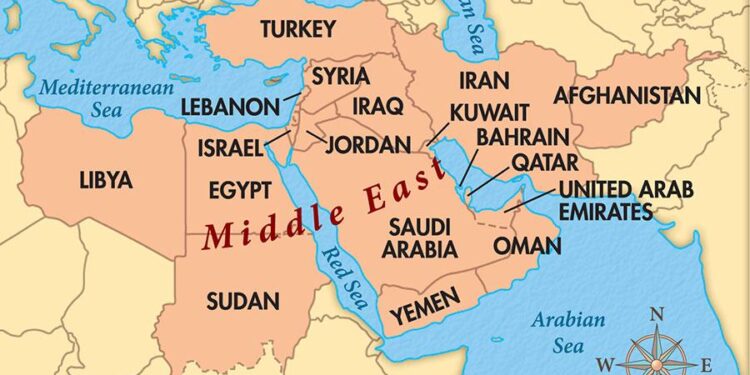Recalibrating U.S. Strategy in the Middle East Amid Rising Gulf Concerns Over Israeli Policies
In today’s swiftly changing geopolitical environment, the United States is reevaluating its stance toward the Middle East, a shift that has sparked unease among its Gulf partners. Israel’s increasingly assertive military posture and aggressive policy moves have raised alarms across the region, particularly among Gulf Cooperation Council (GCC) members who fear the ramifications of an unchecked Israeli agenda. This evolving scenario highlights growing strains within U.S.-Middle East relations and underscores the fragile equilibrium Washington must maintain to keep its alliances intact while addressing regional anxieties.
Gulf Allies Voice Growing Apprehension Over Israel’s Military Escalations
The diplomatic approach of Washington in the Middle East is undergoing notable adjustments as Gulf states express mounting concerns about Israel’s recent actions. Leaders from Saudi Arabia, the United Arab Emirates (UAE), and Qatar have engaged in high-level talks urging a reassessment of America’s steadfast backing of Israel—especially following intensified conflicts in Gaza and contested areas of the West Bank.
These nations emphasize that ignoring their worries could destabilize an already volatile region and weaken essential diplomatic ties. Their apprehensions revolve around several critical issues:
- Escalation Risks: Increased hostilities threaten to disrupt delicate power balances maintained by these countries with various regional factions.
- Peace Process Undermining: Persistent violence jeopardizes prospects for a durable peace agreement between Israelis and Palestinians.
- Swaying Public Opinion: Growing anti-Israel sentiment among Arab populations risks political instability for governments reliant on popular support.
| Country | Recent Diplomatic Activity | Main Objective |
|---|---|---|
| Saudi Arabia | Bilateral meetings with U.S. diplomats | Tackling security challenges and promoting stability across borders |
| UAE | Issued joint declarations supporting conflict de-escalation efforts | |
| Strengthening commitment to peaceful negotiations within multilateral forums | ||
| Qatar | Facilitated humanitarian aid coordination meetings | Mitigating civilian suffering resulting from ongoing clashes |
Navigating Regional Stability: How GCC States Are Responding to Heightened Tensions
The shifting geopolitical currents compel Gulf nations to carefully balance fostering diplomatic engagement with managing rising tensions linked to Israeli assertiveness. These countries are recalibrating their foreign policies amid concerns over how an emboldened Israel might affect their national interests and broader regional security frameworks.
Their strategic considerations include:
- Power Equilibrium Maintenance: Exercising caution toward Israeli ambitions while bolstering indigenous defense capabilities.
- Enhanced Regional Solidarity: Deepening cooperation within GCC members to present a united front against external pressures.
- Global Diplomatic Outreach: Engaging key international actors such as Europe alongside Washington to encourage moderation in Israeli policies.
- Energized Diplomatic Channels: Enhance continuous dialogue platforms involving both Israeli officials and representatives from key Arab nations, facilitating transparent communication aimed at reducing misunderstandings.
- Tied Military Assistance:u00a0Utilize conditional frameworks attached to approximately $3.8 billion annual military aid provided to Israel, encouraging restraint measures aligned with de-escalation goals.
- Broadening Security Coalitions:u00a0Expand cooperative agreements encompassing GCC countries along with Egypt and Jordan, fostering collective mechanisms designed explicitly for threat mitigation related to unilateral military actions.
- Pioneering Advocacy For Palestinian Rights:u00a0Publicly champion Palestinian sovereignty initiatives as part of comprehensive peace efforts enhancing legitimacy perceptions throughout wider Arab communities.
Policy Initiative Expected Outcome
nEnhanced Intelligence Sharingn nImproves early warning capabilities; strengthens inter-state trustn
< td>nStructured Ceasefire Agreementsn< / td>< td>nDiminishes immediate conflict intensity; builds confidence amongst adversariesn< / td>< / tr>< tr>< td>nInvestment In Peacebuilding Programsn< / td>< td>nEmpowers grassroots leadership; fosters sustainable reconciliation processesn< / td / / / / / \ \/ \ \/ \ \/ \ \/ \ // / // / // / ////////////////\\\\\\\\\\\\\\\\////// // // // // // // // // // // // // // // // // // // // // By implementing this comprehensive framework, Washington can uphold its alliance commitments while simultaneously alleviating fears harbored by Gulf partners — positioning itself as an indispensable stabilizing actor amid rapid regional transformations. The Road Ahead: Navigating Complexities Toward Lasting Peace in The Middle East u2014 A Forward-Looking Perspective< / h2>
The evolving realities confronting U.S.-Middle Eastern relations reveal intricate challenges requiring deft diplomacy coupled with strategic foresight.
Israelu2019s assertive trajectory continues fueling apprehension regarding potential destabilization effects on neighboring states.
As America maneuvers through this complex terrain balancing ally support against partner anxieties becomes paramount.
Moving forward demands sustained dialogue emphasizing mutual respect alongside pragmatic policy adaptations geared towards fostering coexistence.
Only through such calibrated engagement can stakeholders hope to cultivate conditions conducive not only for immediate stability but also enduring peace within this dynamic region — one marked by historical grievances yet ripe with opportunities for reconciliation amidst change.
< / article >
| Country | Defense Budget (USD Billion) | Key Military Focus |
|---|---|---|
| Saudi Arabia | 61.2 | Missile defense systems modernization |
| Kuwait
UAE 23.5 Cybersecurity advancements & UAV technology Kuwait 6.9
Tank force upgrades & mechanized infantry modernization This data highlights how these states are investing heavily in defense technologies while simultaneously seeking pathways toward maintaining peace amid escalating uncertainties surrounding Israel’s role. A Strategic Roadmap for U.S. Policy: Harmonizing Support for Israel With Regional Security PrioritiesThe intensifying volatility across the Middle East demands that American policymakers strike a nuanced balance between unwavering support for Israel and addressing legitimate security concerns voiced by neighboring Arab states. A multi-pronged strategy should include: |














